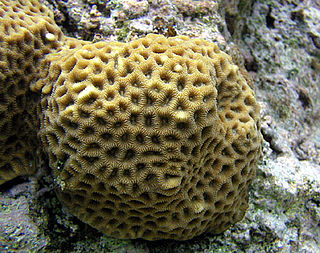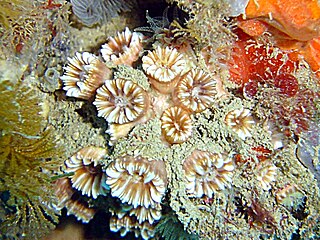
Brain coral is a common name given to various corals in the families Mussidae and Merulinidae, so called due to their generally spheroid shape and grooved surface which resembles a brain. Each head of coral is formed by a colony of genetically identical polyps which secrete a hard skeleton of calcium carbonate; this makes them important coral reef builders like other stony corals in the order Scleractinia. Brain corals are found in shallow warm water coral reefs in all the world's oceans. They are part of the phylum Cnidaria, in a class called Anthozoa or "flower animals". The lifespan of the largest brain corals is 900 years. Colonies can grow as large as 1.8 m (6 ft) or more in height.

Mussidae is a family of stony coral in the order Scleractinia. Following a taxonomic revision in 2012, the family is now restricted to species found in the Atlantic Ocean, with Pacific species transferred to the new family Lobophylliidae. Many species are referred to as brain coral because their generally spheroid form and grooved surface resembles the convolutions of a brain.

The Caryophylliidae are a family of stony corals found from the tropics to temperate seas, and from shallow to very deep water.

Acanthastrea is a genus of large polyp stony corals in the family Lobophylliidae. The colonies are massive and usually flat. The corallites are either circular or angular in shape. The septa are thick near the wall of the corallite, becoming thin near the columella, and have tall teeth. The polyps are extended only at night.
Jules Haime was a French geologist, paleontologist and zoologist known for his research of coral.

Rhizangiidae is a family of stony corals in the order Scleractinia. This family is closely related to Oculinidae. Members of this family are non-reef building corals and reproduce from stolons. The corallites are small and the septa are simple.

Merulinidae is a family of reef-building stony corals.

Dendrophyllia is a genus of stony cup corals in the family Dendrophylliidae. Members of this genus are found at depths down to about 900 metres (3,000 ft). They are azooxanthellate corals, meaning that they do not contain symbiotic photosynthetic dinoflagellates as do many species of coral.

Mycetophyllia is a genus of stony corals in the family Mussidae, commonly known as ridged cactus corals. Members of this genus are native to the Caribbean area. They are zooxanthellate species and are sometimes kept in reef aquaria.

Turbinoliidae is a family of reef building stony corals.

Euphylliidae is a family of marine stony corals of the order Scleractinia.
Rhipidogyridae is an extinct family of stony corals (hexacorals).

Leptastrea is a genus of massive reef building stony corals known primarily from the Indo-Pacific. Although previously assigned to Faviidae, Budd et al. (2012) assigned it to Scleractinia incertae sedis based on phylogenetic results demonstrating the polyphyly of Faviidae.

Heterocyathus is a genus of coral of the family Caryophylliidae.

Madracis is a genus of cnidarians belonging to the family Pocilloporidae. The genus has a cosmopolitan distribution.

Bathycyathus is a genus of cnidarians belonging to the family Caryophylliidae.
Idmonea is a genus of bryozoans belonging to the family Idmoneidae.
Mecynoecia is a genus of bryozoans belonging to the family Entalophoridae.
Proboscina is a genus of bryozoans belonging to the family Oncousoeciidae.
Stomatopora is a genus of bryozoans belonging to the family Stomatoporidae.














